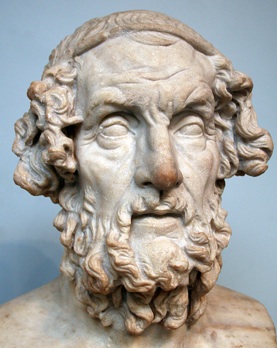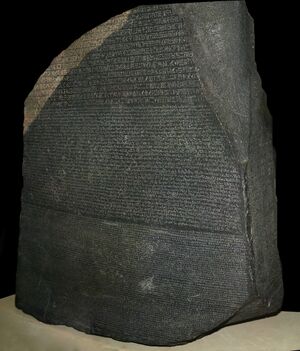Hesiod
Hesiod is a very famous author of the Greek Dark Ages. He has authored two, three or four texts in Ancient Greek (Nobody knows the real number, even if we have access to all his works). His method has heavily influenced the eminent philosopher Hypocrites of the fourth century before Christ. Intense scholarly debate has occurred about his existence as a person, as many think he is a manifestation of the Flying Spaghetti Monster.
Early Life[edit]
Hesiod was born in Greece. During his childhood, he was sung ad nauseam Homer's poems, The Iliad and The Odyssey (along with the 8 others that have since been forgotten because they were either extremely boring or because they were burnt by jealous fake-poets, such as Hesiod) It is taught that he set forth to become a better, and worse, poet than Homer because of these constant reminders of the Prisonner's poetry because of this constant reminder of his poetry that includes gods loving, helping and hating men and being more passionate than the pityful species. Since the great mojority of people at his time taught that as well, it is common belief that he actually found those peoms credible.
Midlife Crisis[edit]
Being of modest means, it is not surprising that Hesiod started to run after the rich elite of the Greece of his day. To please them, he created the hideous collection of lines of Ancient Greek that is now known as the Theogony. They were written on stone tablets, so that the people to whom it was "donated" would be too lazy to remove them from the room which it occupied in its entirety, effectively assuring himself that his works would be preserved trough the ages. In the said collection of words, it was explained to the tyrants or rich folk of his day that the gods created the world and loved the rich, which were far more righteous in their extravagance than the filthy poor. The populace, upon learning of this disgrace, were furious towards the rich for their supporting of the poet. Hesiod, being as cunning as he was, set forth to create another useless collection of words, which is now refereed to as the Cosmogony. This text was even more useless than the other. The population would from then on not be as infuriated as they previously were by the fake poet because they thought he was insane. Notwithstanding this, Hesiod continued his copying spree and came up with the Works and Days, in which the leaders were openly criticized. He rose to fame. Nobody knows why, but he apparently stopped creating, to the great pleasure of real poets.
Later Life and Death[edit]
Many hypothesis have been made by various experts and non-experts about the author's later days. The mainstream opinion is that he continued to write and talk in a schizophrenic manner. According to this theory, people would have later realized that they had been blatantly deceived by the poet. Then, they would have staged a coup towards the supporters of the sly poet and killed him. A small group adhering to the mainstream ideas have proposed that he was killed with hemlock, like Socrates, because the latter was also executed with the said poison.
Influence[edit]
The works of Hesiod are and have been highly influential in the society. Apart from playing a large role in the development of Hypocrites' philosophy, which has in turn influenced most of the politicians of our era (most notably his excellency Barack Obama and her majesty the Queen of France), he is known for having been used as proof in the trial of Socrates, the latter being condemned to death for not respecting or accepting the truths Hesiod exposed in his contradictory works. In addition, he is the main source of inspiration for today's pop artists, which have been proved to be fans of his style of hideous poetry. Some scholars believe that his "prose" has inspired the highly intelligent Abraham and Mahomet during their discourses with angels and god and their later relating of these extraordinary events, thus profoundly shaping modern civilizations and the medieval Islamic civilization.

